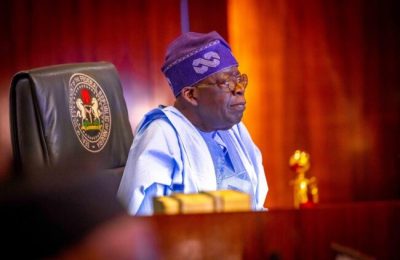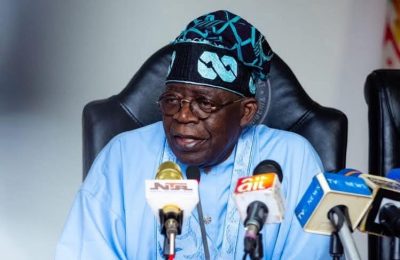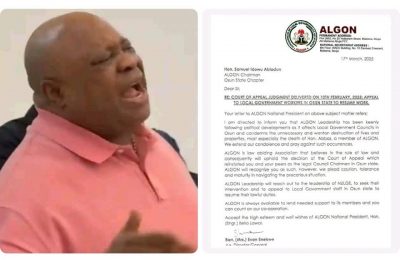
The Coalition of Civil Society Organizations working on credible election under the aegis of Situation Room on Monday condemned in strong terms the arrest and detention of one of the Accredited Observer by personnel of the Department of State Security (DSS) in Kogi State during the just concluded Mock Accreditation exercise initiated by Independent National Electoral Commission (INEC).
The mock accreditation exercise, which took place on Saturday, 4th February 2023, across 436 designated polling units across the 109 senatorial districts in the country, 12 in each State and 4 in the Federal Capital Territory (FCT), was aimed at demonstrating the functionality of the Bimodal Voter Accreditation System (BVAS) which is the technology it intends to use for the 2023 General Elections.

According to the Coalition, the Election Observer was “accused of taking pictures at the location of the Mock accreditation. The DSS claimed to have arrested him for his safety and only released him after high-level intervention by the INEC chairman, who confirmed that Observers were entitled to be at the Mock Accreditation locations.
“Situation Room notes that the Resident Electoral Commissioner for the State, Dr. Hale Longpet, took no action to restrain the security agency from their infringement of the right of Observers to observe the elections.”
Situation Room is concerned that this incident may repeat during the general elections with security agencies interfering with the right of Observers to observe elections on polling day.
To this end, the Coalition stressed the need for INEC authorities to re-emphasize and widely disseminate the right of duly accredited Observers to observe the 2023 elections to assure citizens of INEC’s commitment to organise free polls.
They also stressed the need for security agencies to respect Observers’ rights to observe elections and refrain from interfering with these well-established rights.
In a statement jointly signed by the Convener, Ene Obi, Asma’u Kids, and James Ugochukwu, the Situation Room lamented that the constraints of cash crunch on individuals might impact voter turnout.
Hence, urged Federal Government on the need to work hard and significantly reduce the debilitating effect of the recent currency change, as politicians who have reportedly developed capacity and access to cash from the banks could use it in furtherance of vote buying and inducement to a cash-hungry voting population.
While noting that the BVAS has been used in the Anambra, Ekiti, and Osun States off-cycle Governorship Elections, the Nigeria Civil Society Situation Room, through its deployed Field Observers and other Election Observer Networks, acknowledged that the exercise was conducted in a largely orderly and peaceful manner across the States.
They observed that in most Polling Units (PUs) visited, INEC officials arrived on time. The accreditation exercise commenced at the given time of 9:00 am, while other INEC officials arrived between 10 am and 11 am in some polling units, including Ibaji Local Government Area (LGA) in Kogi State; Orumba North LGA, Anambra State; Wukari LGA, Taraba State and Ado-Odo/Ota LGA of Ogun State.
The Situation Room Observers noted the effective use of BVAS in several areas where a test run was held. There was the presence of security personnel from the Nigeria Police, Department of State Services, and Nigeria Security and Civil Defence Corps in most PUs.
The Coalition also observed Voter turnout in several States in the North of the country was high, while in the FCT, turnout was markedly low at Area 10/Post Office polling unit in the city centre.
Only 16 out of a total of 2,052 on the voters’ register showed up for accreditation, adding that generally, priority voting was recognised, and Persons with disabilities were given priority.
On the functionality of the BVAS, the “Situation Room observed a considerable improvement with the use of the BVAS from the last off-cycle Governorship elections in Anambra, Ekiti, and Osun States.
The generally observed time used in accreditation ranged from 1- 2 minutes for each voter. In Jos North of Plateau State, a particular accreditation took only 7 seconds.
“There were, however, several reports of extended accreditation in some cases nearing 5 minutes. Situation Room observers from Kaura Namoda LGA, Zamfara State, Sagbama LGA, Bayelsa State, and Ibadan North LGA, Oyo State, reported extended accreditation time.
There were even instances where the BVAS could not accredit some voters through the fingerprint and facial recognition options. This was reportedly the case in Gombe LGA, Gombe State, and Abuja Municipal Area Council, FCT.
“Situation Room observers also received reports and witnessed BVAS failing to accredit persons whose physical features and appearance had changed from the first registration. These were primarily persons captured in the first registration exercise of 2011.
“It is also Situation Room’s observation that the BVAS recognition function works better using facial recognition, with fingerprint accreditation being slower. Although, the fingerprint accreditation was much better than in past elections where the BVAS has been used.
The BVAS also appears to have a functional capacity to exclude double accreditation, as was observed in Area 10/Post Office polling unit in City Centre Abuja.
“Situation Room also observed that some voters were reassigned to new polling units without their knowledge and could not be accredited in their previous voting unit when they showed up for accreditation.
This report was received from several States of the country, including Rivers, Edo, Gombe, Bauchi, Jigawa, and F.C.T. These redirections of voters to new polling units without their knowledge could cause significant disruptions ahead of the general elections if INEC does not find a way of communicating the latest fact to registered voters,” the CSOs said in its report.
FOR OBSERVERS IN ELECTIONS:
Situation Room, along with several other accredited domestic and international observers, made efforts and did observe the mock accreditation under the BVAS.
Although the event went smoothly, there was an isolated incident of harassment of an election observer in Okene LGA, Kogi State. Situation Room Observer, Moses Adekoye, was arrested and held for nearly five hours by the Department of State Services officials.
To this end, the Situation Room tasked INEC with creating more awareness about the location of polling units, particularly newly created ones, so voters can go to the correct polling unit on voting day.
The CSOs also stressed the need for training of staff and Ad-hoc staff to be used during the general elections would need to be escalated and cascaded down to enable more staff to be trained, especially with less than three weeks before the holding of polls. It is important to note that if staff struggle with using the BVAS on any election days, this could significantly hamper the election.
“The configuration of BVAS machines would need to be done much more efficiently and effectively. It is important to note that the Mock Accreditation exercise took place in only 436 polling units in the country, with the existence of nearly 180,000 polling units nationwide; there can be very little room for error of configuration on election day as voters may become restless and frustrated with a possible lead to violence if the configuration of the BVAS fails in polling units on election day.
“INEC would also need to address the challenge of BVAS failing to authenticate voters with valid PVCs whose physical features may have differentiated from their original features at first registration.
“From the accreditation test-run just held and a low turnout, it is quite clear that the constraints of cash crunch on individuals may impact voter turnout. The Federal Government may need to work hard and significantly reduce the debilitating effect of the recent currency change.
“Indeed, the cash crunch may even begin to pose a challenge to free votes as politicians who are reported to have now developed capacity and access to cash from the banks could use it in furtherance of vote buying and inducement to a cash hungry voting population.”







